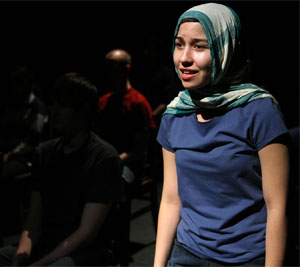 |
| Nessa Trenton plays a Muslim university student from Laramie in The Laramie Project.(Nick Pearce Photo) |
The result is a unique piece of documentary theatre that weaves together the views of 66 non-fictional characters (played by 16 actors) into a cohesive whole. Director Christian Barry says the perspectives the play presents are far from homogenous.
While the play takes a non-judgemental stance, theatregoers tend to respond strongly; news of the students’ choice of production has already fanned the flames of controversy. Ryan Jewkes, one of the fourth-year student actors, says that some people have expressed concern that The Laramie Project is “anti-religious” or “a gay play.” Not only that, he has even received a flyer in the mail from a concerned citizen, who advises people not to see it.
|
Examples like this are exactly what the play seeks to explore: the diverse, contradictory, sometimes heated responses of a community. As Mr. Barry points out, “it puts the responsibility on the audience to consider their own community as the sum of its diverse parts… You can’t say Halifax is the kind of town where this sort of thing doesn’t happen, because you can’t speak for everybody.”
For the troupe of actors who have the task of representing 66 real people, the play presents both a challenge and a unique opportunity. “It’s an actor’s dream, because all of my characters are so different,” says Mr. Jewkes. But his fellow performer, Nessa Trenton, adds that “we’re very conscious of the fact that these are real people and real stories, so we are trying to approach it with a lot of sensitivity.”
Finding it in themselves to relate to characters whose views they might be at odds with is inevitably one of the more challenging aspects of performing such a play; yet Mr. Barry stresses that, in the tradition of Brecht, “it’s not necessarily incumbent upon the actor to mimic the character to the point where the audience would be distracted by that… We’re not looking to give complete portrayals, but rather the essence – it leaves part of it to the audience, so they’re invited to participate via their imaginations.”
